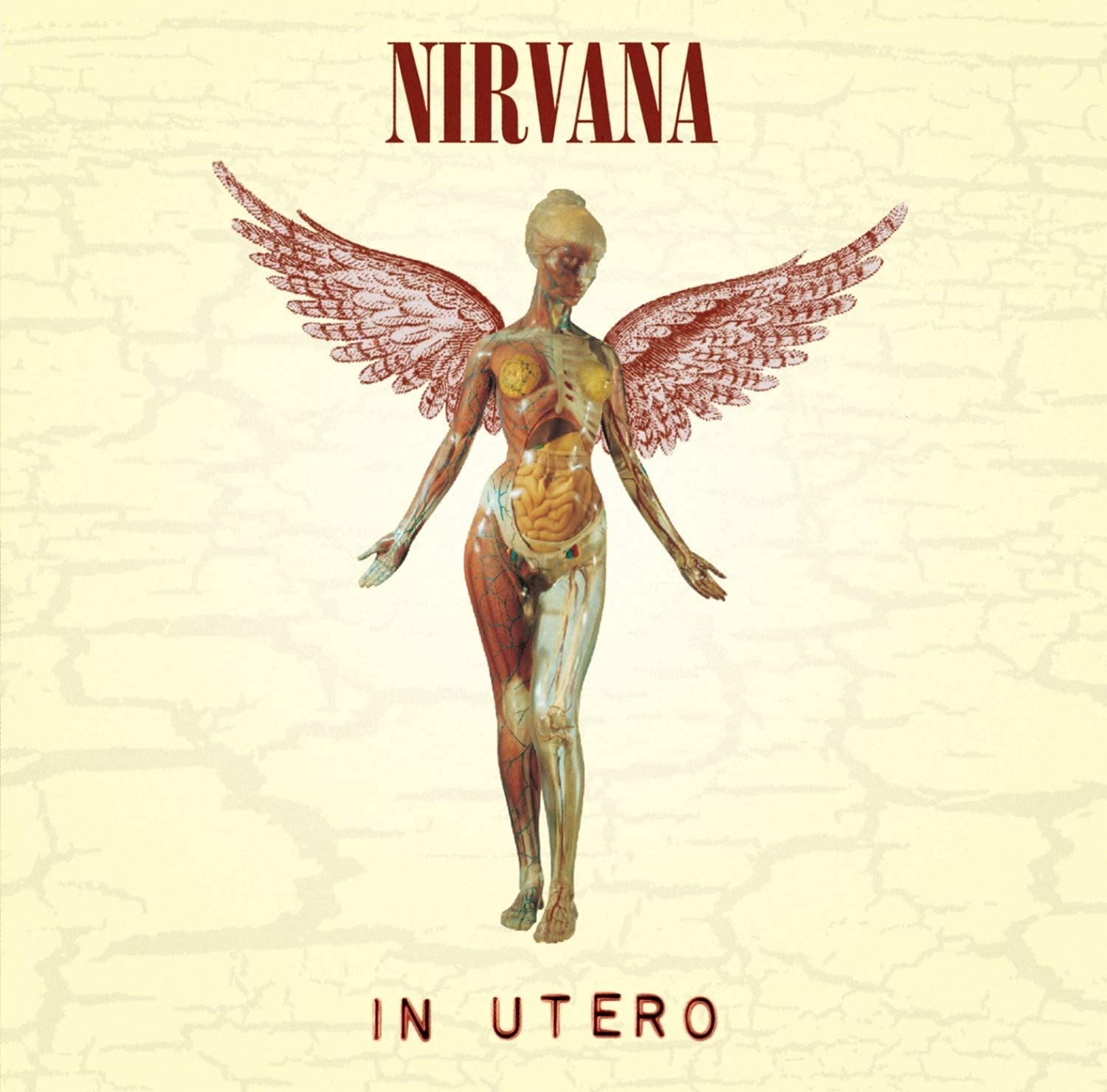This article originally appeared in the October 1993 issue of SPIN. In honor of the album’s release 30 years ago today, we’re republishing it.
You can almost taste the mixed emotions in Kurt Cobain’s mouth on In Utero, spat out as if the singer were trying to expel his tongue along with the lyrics. The more extreme that voice gets (the screams of “go away” on “Scentless Apprentice,” the wash of babble on “Tourette’s”), the more music rises to the bait: grinning slash-and-yearn feedback that’s half drunken game of chicken, half accident scene postmortem. It’s only been two years since Nirvana suddenly gave punk the face of profit with Nevermind, but from the sound of the new album it could be two decades. Fame has aged Cobain’s plaintive rasp, as if celebrity were some kind of public dungeon that turned his shout into a prisoner’s, looking for an echo in solitary confinement.
The songs of In Utero are fractured, spasmodic, wrenched out of shape — notes pulled inside out, meanings stood on their pointy little heads and spun for kicks. Pushed to the brink, Cobain’s mercurial guitar, Dave Grohl’s self-contained drumming, and Krist Novoselic’s split-the-difference bass have never been as cohesive. The sinister, inexorable momentum of “Serve the Servants” leads straight into the bottomless riffs of “Scentless Apprentice,” a playground dissolving to reveal the mouth of a volcano.
This sound — an inclusive black hole — was taking shape on Bleach and the best leftovers that Incesticide collected, only now the scaled-down contradictions of “School” and “Aneurysm” have been blown up (in every possible sense). “Smells Like Teen Spirit” taught how much revulsion and excitement Nirvana could cram into that four-minute format, but it left the rest of Nevermind looking like stock gestures, flimsy excuses, a failure of nerve. But despite the rumors that had In Utero being rerecorded or otherwise toned down (two tracks are acknowledged as having been remixed), and the subconsciously melodic hooks embedded in the noise, this is as reckless as anything since the early ’70s Cleveland punk prophets Rocket From the Tombs went down in flames.
The album’s starting point is the old stardom-as-martyrdom routine, most vividly announced in the back-to-back “Rape Me” and “Frances Farmer Will Have Her Revenge on Seattle.” The former opens with a snatch of these now generic “Teen Spirit” chords, gutting them to hint at media vampirism. “Frances Farmer” is an allusion turned into a slick pun by “Rape Me” — in honor of the hometown actress who was persecuted, institutionalized, and eventually assaulted while undergoing “treatment.” Driven by the music, self-pity is purged and the sense of violation expands, returning as a curse on life itself, “She’ll come back as fire / To burn all the liars / And leave a blanket of ash on the ground.”
Set loose on In Utero, that spirit is able to make all sorts of invisible connections, bringing the ruptures of history to bear on the present. Perhaps that’s how ghostly echoes of “Apokalyptickej Ptak,” recorded by the banned Czech group Plastic People of the Universe in 1975 (and not released until 1992), could have passed through borders of time and place to emerge from the guitar carnage on “Radio Friendly Unit Shifter.” Maintaining this fugitive spirit, it’s not liberation but its absence that gets illuminated in Nirvana’s songs. Instead of barbed wire and secret police, there’s paralysis.
In “Penny Royal Tea,” as bitter and empathetic a song as Nirvana has attempted, the nominal subject is abortion. The title refers to a homemade recipe for inducing one, but it’s not a song likely to comfort people on either side of that issue. With a nod to the Beatles’ “I’m So Tired” (Lennon is surely Cobain’s deepest source as a singer), it’s about the ugly scars any difficult choice leaves. Officially sanctioned guilt bleeds into private despair, false consciousness merges with real pain. “Penny Royal Tea” gives us repression and denial as conditions on which nobody has a monopoly. The song’s not a righteous placard of a fetus or a bloody coat hanger, but a desperate, unresolved awakening to how much of ourselves we’re required to kill and maim every day.
Listening to “Penny Royal Tea” and the rest of the album, I thought of a nearly forgotten punk masterpiece of 15 years ago. Magazine’s hopeless, exhilarating Shot by Both Sides. That’s Nirvana’s motto here: surrounded, lost in a hostile crowd, gagged but trying to talk back anyway. With In Utero, I suspect Nirvana intended on some level to summon up the specter of punk in order to give it a proper burial — drive the final nail in the heart-shaped box and leave behind a fitting tombstone. Setting out to make the last punk album, it made what sounds like the first one instead.





